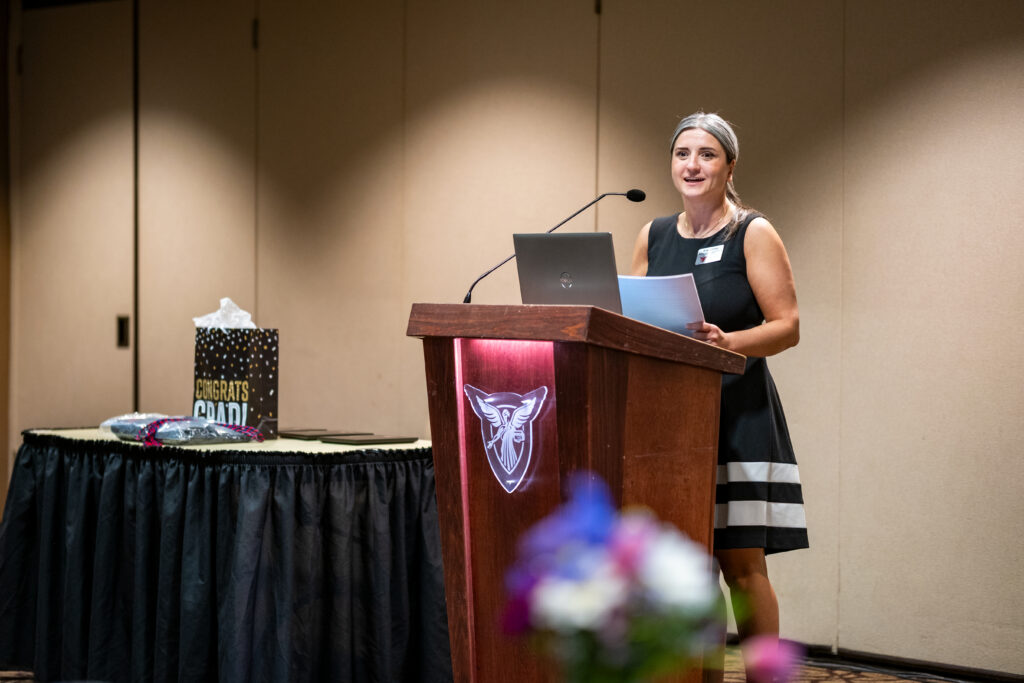24 percent.
That is the average graduation rate of first-generation college students in the U.S., according to FirstGen Forward, a nonprofit organization dedicated to first-generation student success, research, and advocacy. In contrast, the graduation rate of continuing-generation college students in the U.S. is 59 percent. Considering that first-generation students represent more than half of all undergraduates, the disparity is significant. For so many students, graduating with postsecondary education or training often translates to increased job opportunities and economic mobility, underscoring the importance of programs devoted to first-generation student success.
At Ball State, 32 percent of all undergraduate students are first-generation, and in the TeenWorks@BSU program, nearly 100 percent of enrolled students are the first in their families to fly. Recognizing the challenges facing first-generation students in higher education, philanthropist Marianne Glick chose to invest in these students and to build something truly unique and effective at Ball State. Established in 2022 with a transformative $1.8M gift from Marianne, the TeenWorks@BSU program was created to address key factors shown to contribute to lower graduation rates among first-gen students, namely access to both financial and support resources. “My hope,” she shared, “is that more and more students will see the benefit of coming to Ball State, who are part of the TeenWorks Program.”
The TeenWorks@BSU program began as a separate endeavor from—but still in close partnership with—TeenWorks, an organization which has served more than 4,500 high school students since 2016 through its programs and services in Indianapolis, Fort Wayne, Muncie, and Anderson. TeenWorks grew out of the “Pro 100” program, a summer youth employment program in Indianapolis, begun by Gene B. and Marilyn Glick, longtime Indiana philanthropists, and the beloved parents of Marianne Glick. Carrying their legacy forward, Marianne remains committed to and is actively involved with TeenWorks, serving as Chair on the TeenWorks Board of Directors.
Participating in the TeenWorks@BSU program is predicated on students’ successful graduation from the high school TeenWorks program in which they were involved. The symbiotic relationship between programs is designed to build upon the useful skills and experiences gained through the first program, by applying those skills in the collegiate setting and beyond.
TeenWorks@BSU Program Manager Bria Zolman shared “some students credit TeenWorks as the reason college became a reality for them in the first place”—students like Alicia Van Duyn, ‘24, a recent graduate and TeenWorks@BSU alumna. “I came to Ball State with a very different path, I think, than most students. I had a very set plan coming in. Without having had the proper support system like the TeenWorks@BSU program, I would not have been able to graduate within my timeframe.”
In the program, students are granted scholarship support and provided targeted guidance for their educational journey. Students have access to a designated academic advisor, a program manager dedicated to student success, career development and mentorship opportunities, and leadership experience through the program’s Student Advisory Council.
“Nearly 80% of TeenWorks@BSU students received financial, need-based assistance from the program in academic year 2024-25, so having direct access to scholarships and to professionals who are dedicated to their personal and academic wellbeing is a unique part of the program that students highly value.”
Initially starting with 14 students in the inaugural TeenWorks@BSU cohort, the program has since grown to over 40 students. Less than five years old, the program has seen incredible results in addressing low first-generation graduation rates: students are graduating at a rate of over 85%—an incredible outcome compared to the national average. At the current growth rate of the program, it is estimated that approximately 15 students will graduate annually. The success of the program, Marianne pointed out, reflects the staff’s commitment to the students: “the team at Ball State really wraps their arms around these students and makes sure they have all the services they need, and if there are barriers, to help them bust those barriers.”
In addition to financial resources provided, opportunities such as professional development, networking, and mentorship stand out as a difference maker for these students. Current student Alisha Fields, ‘26, has served as a member of the program’s Student Advisory Council, and shared one of the important lessons that will follow her throughout her career. “Before, I always thought a leader had to be the loudest person in the room, to be able to move people, allocate tasks, and be on top and in charge. I realized through my role on the Student Advisory Council, that’s really not what a leader is like. Being a good leader is being able to listen well and being understanding and compassionate. It’s also being a team player—taking a step back and getting other people involved. SAC, and the TeenWorks@BSU program more broadly, gave me the space to practice those skills.”
Bria shared that the program is certainly not done developing, evidenced by new partnerships with the Career Center and the Ball State University Foundation. “We are helping students understand and articulate the intersection of their personal strengths and their professional skills, equipping them to communicate their unique value in the workplace to future employers. In addition, students will have support building an individualized experience record which will help them reflect on their co-curricular learning and growth throughout their college experience.” By focusing on students’ professional development and career-readiness, the program is increasing not only student persistence to graduation but also their success outside of college in their future careers.
As the program continues to grow, so too does Marianne’s gratitude in what TeenWorks@BSU represents.
“To have a small piece in helping students, who might not otherwise have opportunities, be able to achieve their goals and dreams and change not only their lives but change the lives of their current families and their future families—this is really what I live for.”
Click here to return to the Annual Report website.
